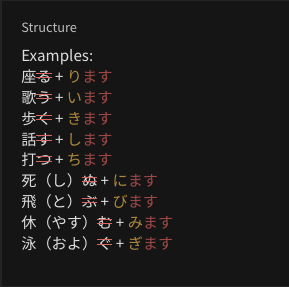Godan verbs: end in a う sound
Structure
- 飲む・飲みます
- 飲んだ・飲みました
- 飲まない・飲みません
- 飲まなかった・飲みませんでした

I can’t decipher what the structure means, can somebody explain which entries correspond to polite / casual forms etc.?
Hey and welcome on community forums 
I hope the conjugation is more understandable this way:
| Verb | Ex. Non-past Short | Ex. Non-Past Polite | Ex. Past Short | Ex. Past Polite |
|---|---|---|---|---|
| V(る5) | 座 る | 座 ります | 座った | 座りました |
| V(う) | 歌 う | 歌 います | 歌った | 歌いました |
| V(く) | 歩 く | 歩 きます | 歩いた | 歩きました |
| V(す) | 話 す | 話 します | 話した | 話しました |
| V(つ) | 打 つ | 打 ちます | 打った | 打ちました |
| V(ぬ) | 死 ぬ | 死 にます | 死んだ | 死にました |
| V(ぶ) | 飛 ぶ | 飛 びます | 遊んだ | 遊びました |
| V(む) | 休 む | 休 みます | 休んだ | 休みました |
| V(ぐ) | 泳 ぐ | 泳 ぎます | 泳いだ | 泳ぎました |
Yep, that cleared this up for me. Thanks!
Just browsing the new pages and this one’s structure seemed confusing…
Are formal form and polite form the same thing?
As it’s used here, yes.
I am so lost on this one, I have no idea how to read the structure,
This is chaos

How does janai turn into jaarimasen 
Edit: I watched some TokiniAndy videos covering this chapter and it was extremely helpful. Do wonder if this could be broken down a little more clearly in the bunpro explanation though. Still don’t quite understand where the parentheses things are coming from.
It’s just nine examples for how to change the last kana in a verb’s dictionary form to the kana from the same row with an “i” sound, and then add “ます”, which is how godan verbs are transformed into their polite ます form. I’m not sure why the grammar point doesn’t actually say that that’s the rule, but other than that, it’s just a lot of examples, maybe to make sure people see some of the cases that are slightly less obvious to us Westerners like how し is the i-version of す and ち is the i-version of つ (basically, problems people have when they learn Japanese with romaji instead of learning the kana first).
As for the parentheses, the kana in parentheses are just how the kanji in front of them are read in those words. I’m not sure why it’s only those four and only on the polite tab.
Yeahhhh, I get the structure now and I completely understand the grammar point but I think bunpro really needs to update this specific lesson for the things you pointed out.
Why only have furigana for 4 of the words, and only the polite forms?
It takes a grammar point that’s fairly simple and makes it really really hard to see what the actual structure is.
Am I missing something or should my answer have been accepted? I opened up the grammar point which specifically shows “ない”, google translate and dictionary lookups seem to show もちない as correct as well.
No, it would have to be もたない.
I was curious so I tried it. Google is not great for checking proper grammar – it takes whatever you give it and tries to interpret what you meant to say. But notice, in the ローマ字, it still recognizes that ‘mochinai’ is not a word and separates it into two…
I totally overlooked and misread the た in the casual form. Thanks!
The ____ is labeled “polite”. But I’m supposed to fill in the casual form? This doesn’t make sense to me. Shouldn’t the ____ be labeled “casual”?
Here’s what the question looks like:
(Polite) → 飲みます
Why is the correct answer nomu (casual form) when the label is clearly asking me to fill in the polite form, which is what’s already on the right side?
I have a question about one of the example sentences.
"学生たちは先生の話も聞きます。
The students listen to the teachers also."
What is の話 doing in this sentence? It doesn’t seem to appear in the translation.
The word はなし can be used in different ways. It can mean “a story”, but in this case 先生の話を聞く means “listen to what the teacher(s) have to say”.
人の話を聞く・聞かない can probably be considered an expression.
This is something that I do find a little frustrating about bunpro.
I want to learn the details and specifics of words/kanji/grammar, but then I read an N5 sentence where the translation is “the gist” of the meaning rather than a more precise translation, and there is nothing to indicate this.
I already knew hanashi as story/talk/tale, so I could infer that the actual translation should be more along the lines of “what the teachers are saying”, but bunpro doesn’t indicate this. If this were a sentence with unfamiliar words or grammar then I would be lost if I tried to use it to learn from. I would be more likely to pick up bad habits.
There are other apps, such as kanjistudy or elon.io that use example sentences but also allow the reader to click on each individual word to find out what purpose it serves in the sentence, in terms of meaning and syntax.
I am still in the 30-day trial period before deciding whether to buy, but I am wondering if bunpro is the one for me.